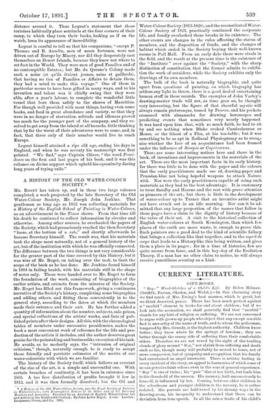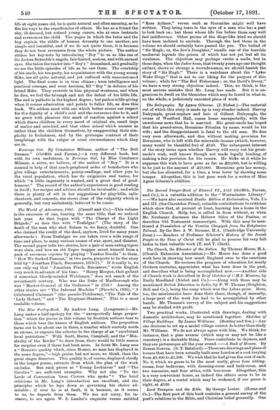CURRENT LITERATURE.
GIFT-BOOKS.
" Boy :" Word-Sketches of a Child's Life. By Helen Milman. (Griffith, Farran, Okeden, and Welsh.)—In this charming story we find much of Mrs. Ewing's best manner, which is great, but we think deserved, praise. There has been much protest against a " morbid" element in books for and about children ; but if we look into the accusation, we shall generally find that " morbid " stands for any hint of religion or suffering. We are not concerned to argue with grown-up people who object that any except sensible fact is unworthy of the name of truth, and to whom the policeman, tempered by Mrs. Grundy, is the highest authority. Children know better; they know where lie the springs of heroism ; they see better through the seamy side of suffering than their comfortable elders. Therefore we are not vexed by the sight of the trailing clouds of glory around " Boy," nor shrink from suffering and death such as his, though many will probably be moved to tears, not of mere compassion, but of sympathy and recognition that his family had entertained an angel unawares. There is artistic feeling in every incident of the story, an appeal to harmonies of which some of us can perceive faint echoes even in the roar of general experience. " Boy " is one of twins ; his " pair " dies at her birth, but leads him to the threshold of the unseen. His memory, half-unconsciously to himself, is influenced by her. Coming between elder children in the schoolroom and younger children in the nursery, ho is rather isolated. His parents are half-vexed by his dreamy ways in the drawing-room, his incapacity to understand that there can be deviation from true speech. In all the minor traits of his child's life at eight years old, he is quite natural and often amusing, as he fits his ways to the expediencies of others. He has as a friend the shy, ill-dressed, but refined young curate, who at once instructs and reverences the child. The pages in which the tutor and the boy explain the riddle of human diversity to one another, are simple and beautiful, and if we do not quote them, it is because they do not bear severance from the whole picture. The author strikes her key-note by introducing " Boy " to us as like one of Sir Joshua Reynolds's angels, fair-haired, serious, and with earnest eyes. She takes the reader into " Boy's " dreamland, and gradually we see the little episodes of life as he saw them. The courtship of his uncle, his tea-party, his acquaintance with the young scamp Mike, are all quite natural, and yet suffused with unaccustomed light. The final scene is in true climax ; keen intelligence and practical courage, and even heroism, fill " Boy " in defence of his friend Mike. They override in him physical weakness, and when he dies, we feel the triumph and not the defeat of his little life. The end is pathetic in the highest degree ; but pathos is life-giving when it rouses admiration and points to fuller life, as does this book. We seldom meet with one which better rouses our respect for the dignity of a child's soul and the reverence due to it, and we greet with pleasure this mark of reaction against a school which draws children in every mood of original sin, small imps of malice and mischief, and that other school which amuses us rather than the children themselves, by exaggerating their sim- plicity to foolishness, and by the grotesque contrast of their imaginings with the vulgar or cruel circumstances which they are in.



































 Previous page
Previous page